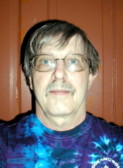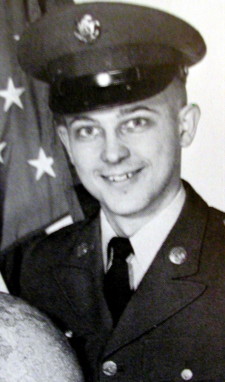|
Profiles
in Patriotism
My
Experiences at
Sheridan Kaserne in Germany
by
Spec 5 David Williams
|

|
Like
most baby-boomers, I grew up with the understanding
that at some point I was going to be drafted and
called to serve the country. It was
something I was willing to do because both my parents
were Navy veterans of World War II. At
any rate, it was something that was expected of every
able-bodied American man. If they
drafted Elvis Presley, they’d surely draft the rest
of us, too.
Of
course, the only problem I had was my sexual
attractions. When I reached
puberty, I suddenly realized I wasn’t like my
classmates. Later on I learned that
the military didn’t want homosexuals in its midst.
I faced a classic dilemma: serving
an organization that didn’t want me, or declaring my
homosexuality before the draft board and getting an
easy out. That latter choice was
out of the question. It was a year
before Stonewall. There were no
such groups as Servicemembers Legal Defense Network.
But that’s beside the point. I
wanted to serve and didn’t see why I couldn’t.
When
the draft notice came in September 1968, I accepted
it. Although, like a lot of us, we
weren’t really military material, I didn’t see why
the millions of heterosexual men being drafted were
any better than me. It made me mad.
The ban on gays in the military was a challenge
I was determined to meet, even though I couldn’t
talk about that personal struggle to anyone until I
got out.
I
knew I didn’t want infantry. I
was uncoordinated and not very physical: a
skinny runt. I would have been shot
my first day in the war zone. So I
decided to enlist for a third year. That
way I could at least have a choice of jobs.
I chose 76Q20: Special
Purpose Repair Parts Equipment Specialist.
I was going to be a supply clerk.

|
After
basic at Ft. Knox and AIT at Ft. Lee , Virginia , I
got orders for ‘ Nam. I reported
to Oakland AFB on August 6, 1969 . But
after I got there, my orders were put on hold, as were
hundreds of others’. We’d
dutifully report for call-up twice a day on the
tarmac, but most of our names weren’t being called.
We didn’t know what was going on.
I
can still remember those long lines of soldiers waiting to have their names called.
I remember one in particular. Though
he was barely 25, he already had a wife and kids.
One day as I was standing behind him, his name
was called. He hesitated a second,
then stepped forward. I’d made
friends with him, and so I was stunned and I thought
to myself, ‘Why him? He’s got a
family and I don’t. Take me!
Take me!” I learned later
he survived the war in one piece, but that one
incident gave me second thoughts about our whole
involvement in ‘ Nam . It still
haunts me.
A
couple of days later, I was on a plane to Germany .
As it turned out, I was part of Nixon’s first
pull-out from the war. I’d spend
the rest of my career on Sheridan Kaserne in Augsburg
, working my way up to Spec 5 in a year and serving as
a clerk at 1st Infantry Division Forward headquarters. |
People
say I got off light. Some think I
have no right to call myself a Vietnam Era veteran
(the technical term for all of us). They
forget what a threat the Russians still posed to
Western Europe . They’d just
invaded Czechoslovakia the year before. Their
armies were only 100 miles from Munich . We
helped keep pressure off the troops in ‘ Nam .
We did our duty.
Of
course, I knew I had to hide my homosexuality while in
the service, but from time to time I had to talk about
it with somebody. After all, I was
still in my early 20s. It was
frustrating, to say the least.
The
first person I discussed it with was a priest at Ft.
Lee . He could offer me little
except calm understanding. In
Germany , I talked about it with a psychiatrist.
Again, friendly advice and nothing else.
I
had better luck with a couple of buddies, both of whom
were fortunately accepting though they didn’t
understand why I’d “decided” to be homosexual.
They’re the few buddies I still think about
today.
I
never had much of a problem,
except for one incident of homophobia.
When
it came time to leave, there was a lot of pressure to
re-up. Several of my
superiors urged
me to continue, but after three years I was ready
to get on with my life. But I did
think it ironic. Had they known I
was gay, they might not have been so eager to keep me.
That was how it went back then, though.
I accepted the system with no hard feelings
toward anyone. It was only two
years after Stonewall. I was just
one homosexual with no support system, not even any
gay friends, to turn to.
During
my time in Augsburg , the Stars and Stripes newspaper
did have a feature article on another, unidentified
gay soldier in Germany . I must
have read the article five times. Talking
to a reporter about being gay was something I would
never have done, so I cringed a little. I
was in the army to serve and serve honorably.
I wasn’t going to jeopardize it simply by
revealing my true identity.
Like
most gay soldiers at the time, I passed through the
system virtually unnoticed. When my
three years was up in January 1972, I was ready to get
out. Six months later I finally
came out back here in Louisville and never looked
back. Ten years later I became an
activist in Louisville ’s gay and lesbian community,
eventually founding the Williams-Nichols Archive &
Library for GLBT Studies at the University of
Louisville and becoming editor of our newspaper, The
Letter. Ironically, some of the
things I learned during my military career, like
self-discipline, helped me in those later endeavors.
©
2008 Gay Military Signal
|